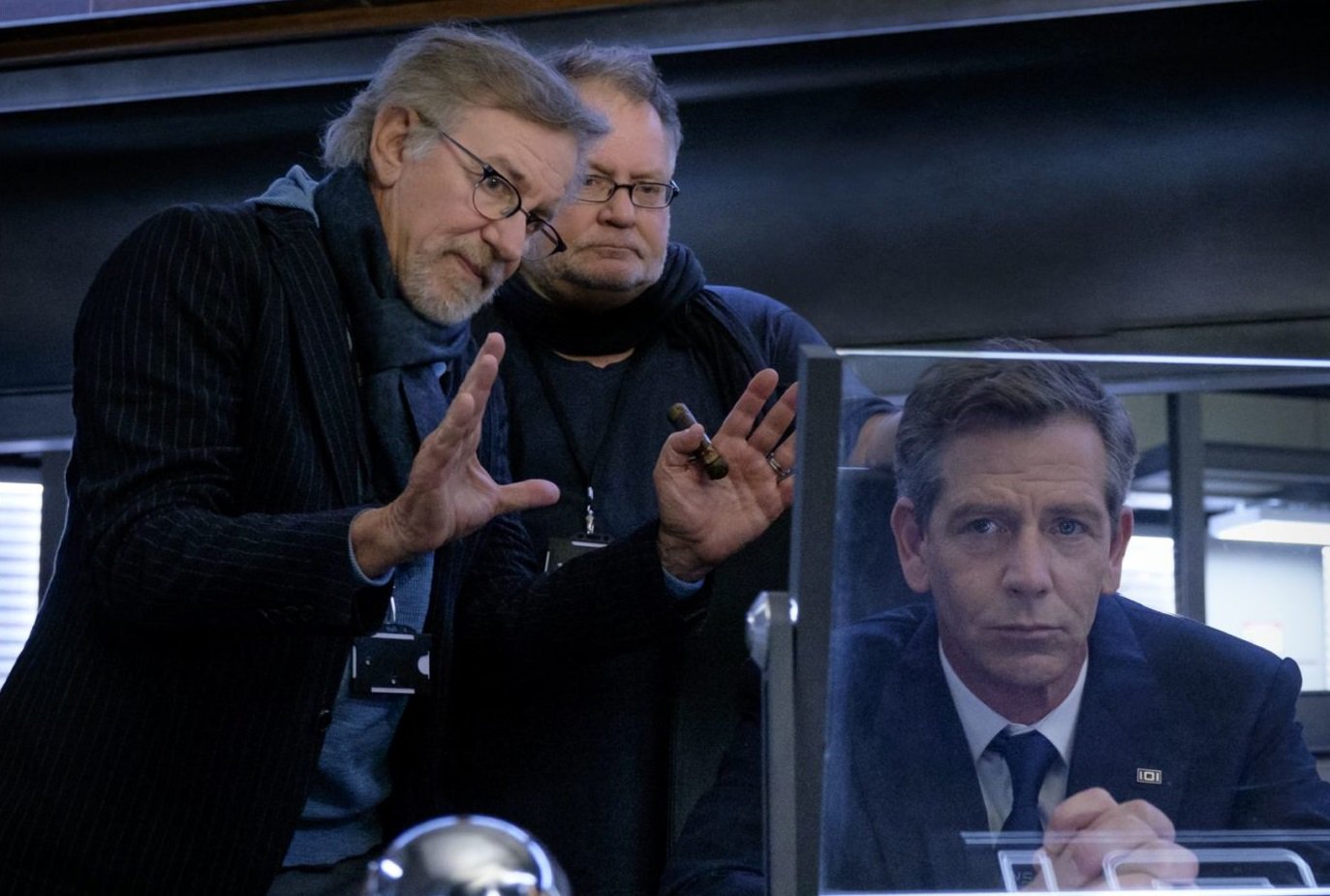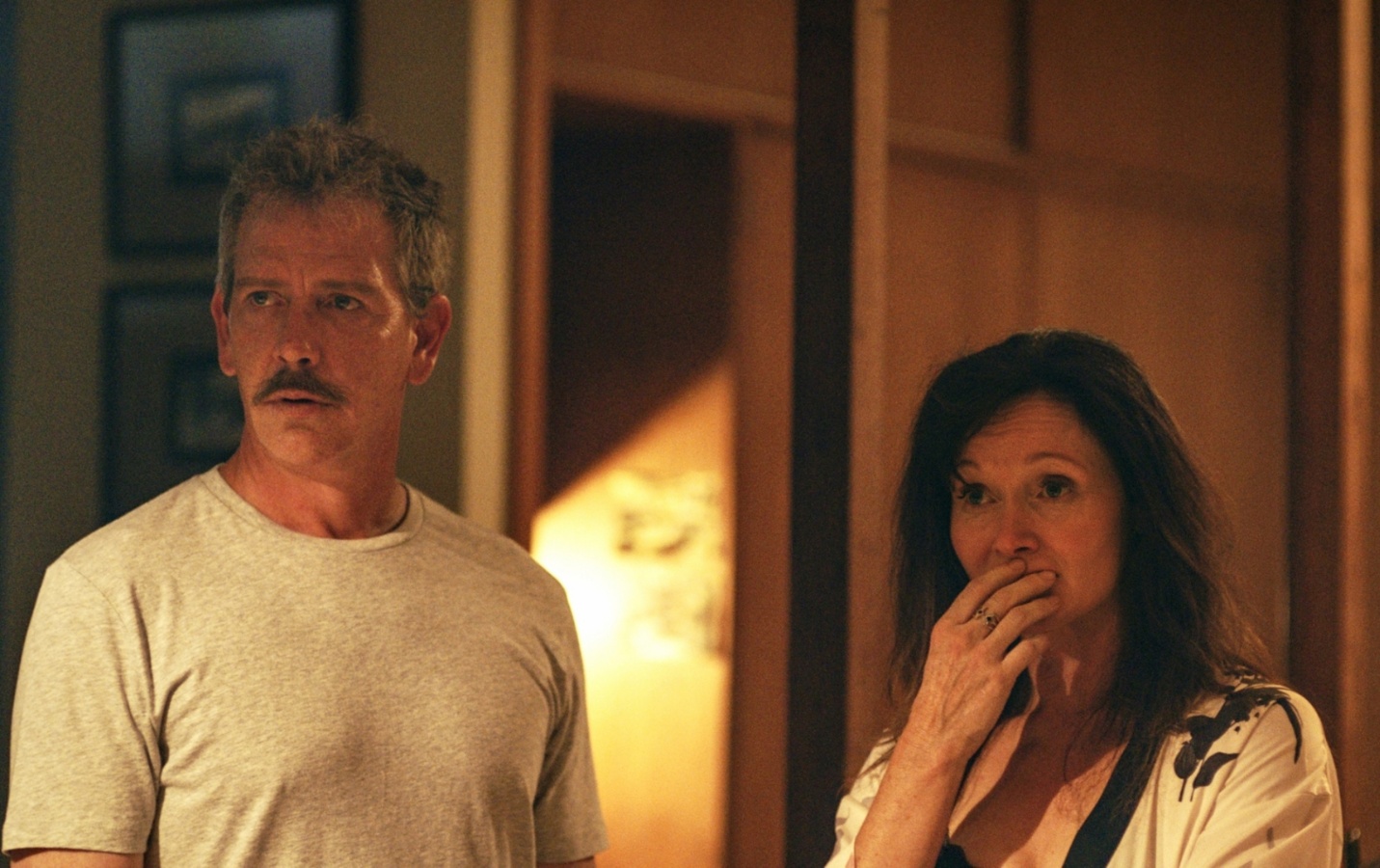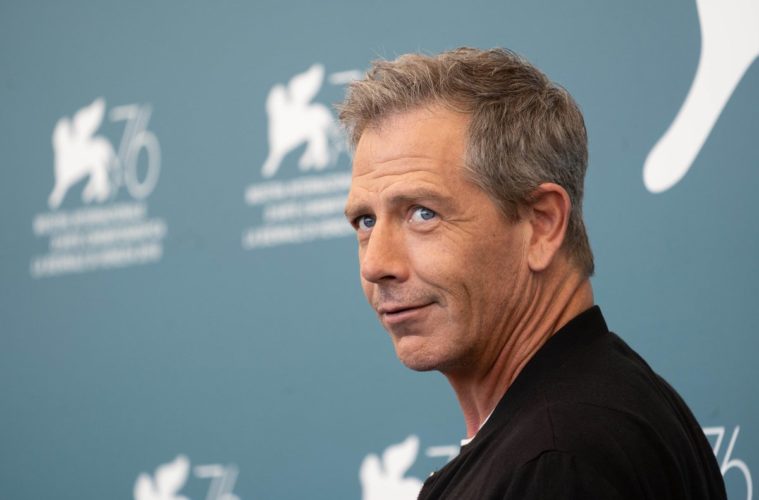As we reach the end of a tumultuous decade, there are some things we can say with a degree of certainty: the Cubs won the World Series, Greta Thurnberg sailed the Atlantic, political chaos reigned, and Ben Mendelsohn was in just about everything. After breaking onto the international scene playing Pope–the eldest son of an Australian crime family–in David Michöd’s Animal Kingdom in 2010, the actor’s star has continued to rise. And in the time since he has been simply unavoidable; appearing in both the Star Wars and Marvel universes while working alongside some of Hollywood’s biggest filmmakers, more often than not playing larger than life antagonists.
The first project in some time to buck that trend was Shannon Murphy’s debut Babyteeth, an Australian production in which Mendelsohn plays Henry, the benevolent but flailing father of a precocious and terminally stricken teen girl. Playing first in competition in Venice and more recently the Marrakech Film Festival, Babyteeth is the first movie Mendelsohn’s made in his home country in eight years. The role is also that rarest of things on the actor’s CV: a plain old, flawed human being.
The Film Stage: What brought you to Babyteeth in the first place?
Ben Mendelsohn: Well, Shannon Murphy, this was her first film. She’d done some television before. It was my agent in Australia, Leanne Higgins, who had seen the play and was aware of the screenplay for some time. She was very instrumental in a lot of things in that movie. She brought it to my attention. I read it and I thought it was beautiful. I thought it had a lot of Australian virtues in it and so it was more the film than it was the part. I just felt that I wanted to be in that film and Henry was a chance to be sort of benign and beta, if you like. There’s a delicateness in the film as a whole, where you have this guy attempting to modulate or control the anxiety of his wife, and ends up one of these guys. He’s a classic mansplaining kind of guy in that way. He knows it but he can’t do it. And I just thought it was a nice balance to hold up there between keeping things light, keeping things balanced, but also making sure that we could feel it.
You returned to Australia with this film after nine years in the United States. What “Australian virtues” did you see in the script?
I don’t think they’re uniquely Australian, but I’ve been living in America; so this idea that you would tolerate a junky boy living in your terminally ill daughter’s house just struck me as a particular kind of moral dilemma and grey area that felt like it could take place at home a lot more easily than it could in America. I only have a sense, a feeling about a place and a certain experience. I’m by no means authoritative on this but to me that’s just what it was. I hadn’t gone back in a very long time and I had no reason to but I read that script and I just thought it was really beautiful. It is one of my very, very most favorite films I’ve ever made. I absolutely fucking love the film. I think it’s incredibly feminine; it’s got a sensibility to it. If it was directed by a man… there’s just something beautiful. It’s far exceeded my expectations and it’s done it in a very soft quiet storm kind of way.
Along with the coming home aspect, it was also a jump from these huge villainous roles to something subtler. How did you navigate that?
Well, this was sort of part of the attraction to me too, was the thing of getting away from that. I think I touched on it earlier, to go back and sort of just play a more benign kind of character. And it’s softer, it’s got a sensibility which I get. It’s sort of baked in from Australia. It’s that rare thing, where it’s a script you put down and you feel very beautiful about.
How was working with Shannon Murphy after working with these people with so much experience, and on these massive stages? That shift in scale, was it unusual?
Yeah, well it was like going home. There’s a lot of things you lose touch with. The sort of earthiness, the close to the ground way we make film [in Australia]. You know, some of that is really delightful, some of it’s a pain in the arse, and some of it’s very unnecessary. [Laughs] There are ways that both approaches have bits to it which are really good and effective and bits which are like, okay. But you get aboard the ship, and that’s essentially a pretty good metaphor because you do go on this journey together and you set sail and you’re in the ship you’re in, man. They all have their charms and their difficulties. It wasn’t a fun shoot. It was a pain in the arse; it was really difficult. It was really really hot; they were very time-constrained, I was very time-constrained. You don’t know how they’re gonna work out. The way they feel when you’re doing them is no guide whatsoever. They can feel wonderful and then you can get the surprise of, yeah, you had a great time and it succcckkks. Much better is to have a really shit time and they end up well. It’s sort of a loose rule of thumb but it does pan out a lot. If you have a really crap time doing it, you’ve got a chance.
You also reteamed with David Michöd recently on The King. How was it working with him after all that time?
It was very beautiful to go and be with David and Adam. I mean, I did that film because David gave me my career. I mean, Sean gave me my career, in The Year My Voice Broke, but David gave me this period of my career. It doesn’t exist without David. So I would carry a spear for Dave and when he asked me to come and do that, absolutely. But you know, Timothée is a proper fucking movie star, and he’s awesome and he’s really lovely to be around and he’s got a great vibe. I’m not immune to the fancy pants stuff of this business and I get caught up in that kind of excitement about that kind of stuff as well.

That’s something I wanted to ask. In the time you’ve been in the States you’ve worked on the biggest stuff imaginable: Star Wars, Marvel, Spielberg, Nolan. Does anything surprise you anymore?
Oh, fuck yeah. I get surprised and delighted all the time. I think Spielberg was probably the most instructive because there he is! THERE. HE. IS. You know [snarls] the mighty, the fuckin MIGHTY, but there’s a childlike enthusiasm and a connection to the work, and it’s kinetic and it’s felt, so you feel like you’re doing it, and you see him make up his shots as you’re doing it and you don’t expect that. You don’t expect people to be alive with the bare material to the degree that they are. So I am [knocks the table]. I mean, filmmaking is, by and large, tedious and boring. And finding a way to get life in there, even just to react with a kind of something like an aliveness, that to me is the art of it.
There are plenty of exceptions but in the main, if people have a sense of aliveness when they’re going through the scenes it’s very strong for an audience. People feel it a lot more. They may not know why, but if you’re just letting yourself be there and go along these emotional bits and pieces, people will feel it. And they won’t even necessarily know why but it’s to do with the sophistication of our mirroring abilities and whatnot. When we see someone, we see their face. We can know what feeling they’re going through and if we feel a little bit connected to them we will feel the same feeling in this sympathetic kind of way and film has been wonderful at engaging us when the stuff is good.
How do you behave with directors?
I behave very loosely. I’m kinetic, I keep moving. There’s a restlessness in me that sometimes you can see translated into film. If you see The Year My Voice Broke, that kind of rolling restless energy is as close to what I’m like when I’m relatively happy around a big bunch of people. I kind of have a restless kind of discomfort. I’m kind of like a dog [barks enthusiastically] and I have that kind of vibe and that can work out really well on a set. It can work out well occasionally and it can also be an enormous pain in the arse for people. Depends on the situation.
Were you beginning to get kind of sick of these villain roles?
I wouldn’t say I was sick of the villains. I took them as a great compliment and I hope they’re not gone forever cause I’ve actually played quite a few good guys now, in a row, and the next one I play will also be. So I’ll be getting keen to get back to the dark side before terribly long. I don’t want to disappoint the people watching, that’s my main thing. I’d like to be as fancy pants as I can be. I like to be as versatile and muscular within that versatility. Effective, that’s probably it: I’d like to be effective in as broad a range as I’m able to but I’m not out there searching for my “boundaries.” It’s much more interesting and satisfying to be in something that works as a whole. To be on a good ship, you know, and I take the villain as a great compliment anyway. I think it’s when I knew things were going very well was then and I felt, okay, this has got a real chance of continuing. It was fairly recently when I did The Outsider for HBO, which is very much a good-guy central-role series thing. That was when I felt, okay there’s a chance here.
Can you talk a bit about The Outsider? What made you get involved?
It was really part of the sales pitch. Jason felt very, very strongly about making it and felt that we had a pretty good chance and I’d watched Ozark and really loved what he did with that and I thought we had a reasonable shot at it so off we set sail. These are very Australian virtues, you want to make sure it comes from outside to in. Now, we could do with a little bit more James Brown in our life but we’re not there yet.

It’s been 32 years since The Year My Voice Broke. Australian cinema has changed a lot, different stories are being told. Is there still an Australian identity in cinema you can point to?
It’s harder to speak about. It’s probably easier to point to it and go, there it is. I think Muriel’s, for instance, in a lot of ways is of the period. Muriel’s to me is the one that stands out as the singular most kind of Australian. And you can point to it but it’s not unique–the combination and the blend of them is unique. Like the koala is unique but we’re not the koala. Kangaroo, same. But yeah, I think so. There is and will be for some time. But I also think that a funny thing starts to happen when you culturally export and project enough and it starts to leak into other cultures, particularly in the anglo-sphere. There’s many Australianisms you can feel. You go to England, you go America, you feel that they picked up little bits of them. Like “no worries mate,” that’s now traveled. And I get all [slouches back] that’s fucking one of ours. And we made the first feature film on Earth anyway! So everyone can suck our… you know. We made the first fucking one on earth! Wikipedia that shit. That’s ours. All you other motherfuckers just ran after us and we just dropped the ball for 50, 60 years and picked it up again.
You spoke about returning to the dark side. Will we ever see Director Krennic again?
Not that I know of, unless we want to do an Irishman sort of thing and pixelate me into a younger me. I mean, Krennic looked like he was in a lot of trouble the last time I saw him but who knows? It’s a wonderful universe but not that I know of.
But you know, when you are growing up and you go and watch movies or you watch television and you have a relationship with what you see on the screen, that is quite special to you and it means something to you and you feel like you’ve got friends and people and things that you know about because of your experience of watching it. And it protects you a little bit from the world. Being in Star Wars is that kind of [feeling]. Star Wars was an incredibly important movie to me when I was a little fella. I like to think the best love letter I COULD EVER send to life is to be in that film. Cause I saw it in Melbourne when I was 7 or 8, it had just come out, and there’s been a lot of Sturm and Drang between then and now, but particularly in that time as a child when you can’t do anything but go along with the tides as they are. Sorry, I digress. No plans but, God, I’m up for it.
David brought The King to Netflix and we’ve seen Scorsese going that way too. Are we seeing the end of a kind of cinema as we know it?
Here’s one thing I know about our species: we’re crap at predictions. We can do it a bit and we can do it in certain circumstances but we’re really not great at it. I think we have a lot of anxieties and stuff. Mad Max is on in this festival. Mad Max is built around the idea–and I can remember this from when I was a kid–that the world was gonna run out of oil in 30 years. I don’t know, I’m glad someone’s doing them. It’s not the ‘90s any more where we had a vibrant and muscular and really cool independent film scene. And for me it was really the ‘80s anyway, the really great ones that I was in touch with. They were very much the ‘80s but they carried on well into the ‘90s–the Tarantinos, etc. That’s gone and were people to, you know, vote with their feet and go out and see interesting heartfelt films they’d make a lot more of them. But the dynamics that drive all this stuff have long been pretty hard-nosed. It’s a weird blend in that way. I still think we’re in a golden age, not in cinema per se, but in terms of screen and long-form storytelling that we’ve had with the rise of the HBOs and all that. So, I don’t know, it has changed but I think we’ve got a few moves left.
Babyteeth screened at Marrakech Film Festival and will be released by IFC Films in the U.S. next year.

